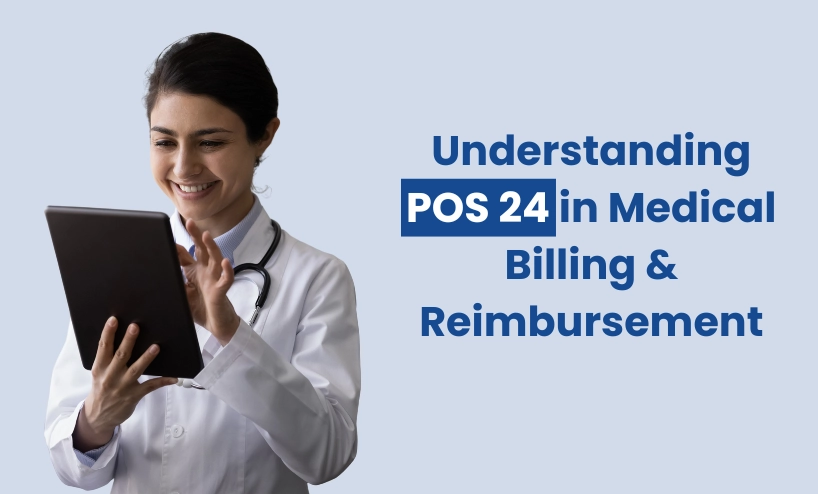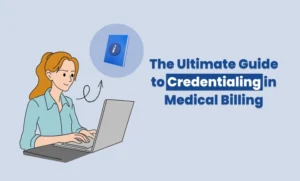POS 24 is a critical Place of Service (POS) code used in medical billing to indicate that healthcare services, specifically outpatient surgical procedures, were performed in an Ambulatory Surgical Center (ASC).
This coding plays a pivotal role in billing workflows, reimbursement calculations, and compliance with payer regulations.
When to Use POS 24 on CMS-1500
Use POS 24 whenever a healthcare provider performs an outpatient surgery or procedure in an ASC.
- The code must be entered in Box 24B (“Place of Service”) on the CMS-1500 form for each line item representing a service or procedure done in the ASC.
- It distinguishes the ASC setting from other locations like the physician’s office (POS 11) or hospital outpatient department (POS 22).
- Correct use of POS 24 ensures appropriate Medicare and insurer reimbursement based on the outpatient surgical setting, reflecting that the service was not offered in an office or hospital.
Additional Requirements for CMS-1500 Box 24 with POS 24
- Along with POS 24 in 24B, enter the correct procedure code (CPT or HCPCS) in Box 24D.
- Include any relevant modifiers that specify the details of the procedure.
- Link the service to a diagnosis code in Box 24E to justify medical necessity.
- Accurate POS 24 usage is required for claims processing; incorrect POS codes risk denials or delays.
Comparison with Related POS Codes
| POS Code | Location Type | Typical Use Case |
| 11 | Physician Office | Regular office visits |
| 21 | Inpatient Hospital | Admitted patient services |
| 22 | Hospital Outpatient | Outpatient hospital procedures |
| 24 | Ambulatory Surgical Center | Outpatient same-day surgical centers |
Does POS 24 require authorization?
Yes, POS 24 services typically require prior authorization from insurers before procedures are performed. This applies to both Medicare and most commercial plans. Authorization ensures the service is medically necessary and will be covered.
Most payers, including CMS, mandate prior approval to prevent unnecessary procedures and confirm coverage. Failure to obtain authorization can result in claim denial, no reimbursement, or audit issues.
Starting August 2025, additional codes in outpatient hospital settings, including POS 24, have been added to preauthorization lists for certain insurers like UnitedHealthcare.
Always verify patient-specific requirements before scheduling procedures, as policies vary by insurer, procedure, and location. Proper prior authorization minimizes claim delays and financial risk.
POS 24 reimbursement rates
Here is a clear tabular summary of the POS 24 reimbursement rates based on the Ambulatory Surgical Center (ASC) payment system by CMS:
| Category | Details |
| POS Code | 24 (Ambulatory Surgical Center) |
| 2025 ASC Conversion Factor (Compliant Centers) | $54.895 per relative value unit (RVU) |
| 2025 ASC Conversion Factor (Non-Compliant Centers) | $53.828 per RVU |
| Quality Reporting Requirements | ASCs meeting Centers for Medicare & Medicaid Services (CMS) quality reporting program receive higher reimbursement. Non-compliant ASCs face a payment penalty. |
| Payment Calculation | Payment = Conversion Factor × Procedure Weight × Adjustments (e.g., wage index) |
| Effect of Quality Reporting | Approximately 2% higher payment for compliant ASCs compared to non-compliant ones. |
| Reimbursement Impact | Using POS 24 on CMS-1500 signals payers to apply ASC-specific rates instead of hospital or office rates. |
| Additional Notes | CMS updates ASC rates annually; accurate coding and compliance maximize reimbursement. |
This table clarifies how POS 24 usage links to ASC-specific reimbursement, emphasizing the importance of compliance with CMS quality programs to optimize payment for outpatient surgeries in Ambulatory Surgical Centers.
Compliance and Documentation
Using POS 24 correctly is mandated to avoid compliance issues. Misuse, such as coding ASC services as office visits (POS 11), can trigger payer scrutiny or recoupment.
The ASC’s physical location and the nature of the services must be clearly documented to justify POS 24, especially in settings where physicians operate both office practices and ASCs.
Conclusion
POS 24 is more than just a billing number; it reflects the setting’s operational focus on same-day surgeries. Its precise use affects payment models, compliance standards, and ultimately healthcare provider revenue cycles.
Mastery of POS 24 coding is essential for professionals managing outpatient surgical billing to ensure financial integrity and adherence to regulatory expectations.
If you’re looking to strengthen your POS 24 billing accuracy and maintain full compliance, RevenueES can help. Our experienced billing specialists ensure every outpatient surgery claim is properly coded, fully documented, and reimbursed at its true value. Connect with us today to enhance your billing performance and protect your revenue cycle.





